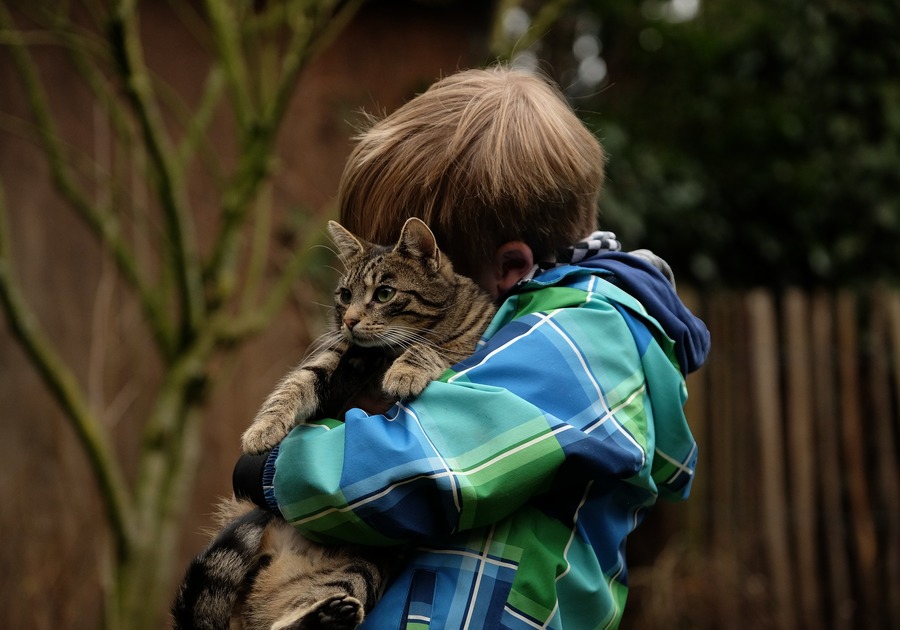The death of a family pet has a meaningful impact on the life of even a very young child. Whether the pet is a dog or cat that your family has loved for many years, or a tiny goldfish that has lived in your home for a several days, this can be a significant event for your child. Parents often wonder how best to talk with, and to help their children cope when a pet dies. There are effective strategies for parents to offer support and to help young children deal more comfortably with the death of a pet.
Parents sometimes, understandably, wish to shield their young children from the death of a pet with the hopes of lovingly protecting their children from sadness or grief. However, even very young children are highly attuned to these events. Parents can offer great support by being available to help children with their feelings and to talk honestly together, in a manner that is developmentally appropriate for the child. Children feel most secure when they experience loving and supportive conversations in which their questions and concerns are responded to by the adults they most trust and love.
Where to begin?
Most young children do have some understanding of the concept of death – from stories, from observations in nature with the death of plants or small insects and animals, or from information they have overheard or learned from others. At the same time, children often have many confusing thoughts about death, so that it is important that parents find ways to help children to sort out their questions and concerns.
Find a calm time in which you and your child will not be rushed on to another activity, but rather will have some time to spend with each other after talking - for a relaxing walk or to play together for a little while. One of the best ways to prepare is to take time, in advance, to prepare yourself so that you can be as relaxed and calm as possible, when speaking with your child. It is ok for children to see that their parents are feeling sad in a way that is not overwhelming or excessive. Children are very much attuned to the feelings of their parents and influenced by the emotional tone as much as by the words parents use to explain such events. It is very helpful to remind children that even if they feel very sad right now, that they will feel better again with time, and that their parents and other people who love them will help them with their feelings along the way.
What to say?
It is best to begin by preparing your child by letting him/her know that you have some important information to share about your pet. (Sometimes, the child may let you know that he/she is already aware of the pet’s illness or pending death.) Offer a gentle and clear explanation, but limit, initially, the information to the fact that the pet has died, or will soon die. Your child’s trust in you supports his/her sense of security and comfort, so it is important to be honest and to use the words, “death/died”, rather than expressions such as “gone to sleep”, or untrue explanations, such as the pet, “got lost” or “ran away”, which can increase children’s fears about sleep and regarding separations. While being honest, it is important to limit your words to information that is developmentally appropriate, so as not to overwhelm your child with too much technical or upsetting information. Keep the conversation within your child’s comfort zone, based on his/her unique temperament and personality, and notice your child’s verbal or non-verbal signs that he/she is ready for a break from the conversation.
It is helpful, if possible, if a child can be prepared, in advance, that a pet is likely to die soon. A simple clarification that death means that the pet’s body is no longer alive can be helpful. At this point, it is often best to pause and to learn more about what your child is thinking. It is always best practices to hear from your child what he/she understands or is wondering about so that you can tailor your explanations specifically to your child’s needs, and not to offer more information than your child can handle at any given time. Young children often have very concrete questions they may wish to have answered.
What might young children worry about?
It is developmentally appropriate and expectable that young children view the world through their own perspective, limited to their own lives and experiences. For that matter, children may sometimes wonder if outside events are related to or caused by them. Young children often wonder if they are responsible for outside events, for example, “Is it my fault?” It is reassuring to remind children that the death of a pet is nobody’s fault, but rather that, for example: “Spots lived a long dog’s life, and his life was over, but nobody did anything wrong.” Or, “Spots had a dog sickness that no one caused, and that people cannot get, and this is nobody’s fault.”
Children are most inclined after a loss to wonder about their own safety and security. As a result, children sometimes extend their thoughts about a pet’s death to worries that their loved ones, and especially those upon whom they depend the most – their parents - might also die. When a pet dies, young children will often ask their parents, “Are you going to die?” Parents should be prepared to offer supportive reassurances to young children, at these times. Children with such concerns may be temporarily more worried or anxious and therefore benefit from additional time with parents, while still maintaining regular routines.
What to expect next?
Children’s feelings during times of loss and grief can often be unpredictable to parents and to children, themselves. It can be helpful to let children know that when a pet dies, “Children and grown-ups can have all sorts of different feelings, and that is OK. Sometimes, people feel sad or even mad right away, and for others, feelings come at different times.“ It is best to follow your child’s lead in terms of if and when he/she wishes to talk about the pet, and when your child needs (or shows you through his/her actions that he/she needs) a break from the conversation.
Tips to help your child with the death of a pet:
Consider helpful activities: Children feel secure and confident when they are empowered to take some sort of positive, adaptive action related to challenging events such as a loss. Sometimes, children feel better when they can mobilize their feelings towards a family project: such as creating a memory book with drawings or photos of their pet, or planting a special mini garden or small tree as a “memory spot” for their pet.
Consider helpful rituals: Depending upon your child’s age and personality, he/she may benefit from a small and gentle family funeral for the beloved pet.
ALWAYS prepare your child: Prepare your child well for any new event. Children feel most comfortable when they know, in advance, what to expect. If you plan to have a burial or funeral for your pet, let your child know beforehand what will happen, step by step, and review these plans with your child. Some children may like the idea of saying a few words about their beloved pet, or playing a piece of music in memory of their pet. Children should remain in the lead and feel welcome to change their mind if they decide they do/don’t wish to participate in this way.
Encourage breaks: Let your child know that he/she is welcome to take breaks at any time, and arrange in advance to accommodate for that possibility, so that this offer can be easily arranged if requested by the child.
Pay special attention: After a significant event such as the death of a pet, be especially attuned to your child’s emotional tone, recognizing that coping with loss is a gradual process that takes time. Children often face these types of challenges with temporary regressions (steps backwards) in development. Be alert to signs of increased anxiety or sadness so that you can offer additional support. Extra time to relax with and play with parents provides much needed support at these times.
Know when to seek professional support: If your child is suffering from overwhelming anxiety or sadness, frequent tearfulness or other changes in behavior, difficulty managing regular routines, trouble functioning well in school, inability to enjoy activities, or changes in sleep and appetite, it is best to consult with your child’s pediatrician and/or a child psychologist to determine the best way to help your child through this time.
We’d love to hear from you!
Please send your comments and questions about this topic to:
If you have a topic which you would like to learn more about from Dr. Landau-Millin at Macaroni Kid, please email LaniM@macaronikid.com.
About the author:
Rebecca Landau-Millin, Psy.D. (www.drlandaumillin.com) is a licensed psychologist in private practice in Chevy Chase, Maryland. She received her doctorate in clinical psychology from The George Washington University. Dr. Landau-Millin helps young children, teens, and adults, and also provides parenting consultations and couples’ therapy. For more information, please contact Dr. Landau-Millin at (301) 922-1114 or at RebeccaLandauMillin@gmail.com.



